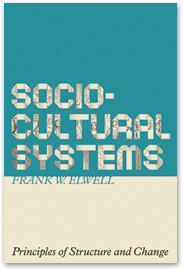
Sociocultural Systems: Principles of Structure and Change Macrosociology: Four Modern Theorists A Commentary on Malthus" 1798 Essay as Social Theory Great Classical Social Theorists In the Classical Tradition: Modern Social Theorists Dr. Elwell's Professional Page
|
rbert Spencer's Evolutionary SociolJohn Bellamy Foster | |
|
Foster on US Imperialism
Like Wallerstein, Foster (2006) offers a Marxian analysis of the relations between core and peripheral nations that have grave consequences for global inequality between and within nation-states, as well as nuclear proliferation and the likelihood of nuclear war. In his analysis Foster examines details of historical and contemporary foreign policy of the US and finds that much of that foreign policy, particularly since World War II, has been aimed at strengthenin The roots of American imperialism lie in capitalism and the capitalist world system. “From its beginning in the sixteenth and seventeenth centuries,” Foster writes, “and even more so in the monopoly stage, capital within each nation-state at the center of the system is driven by a need to control access to raw materials and the labor in the Until recently, Foster reports, American imperialism had limited aims and goals within a well-defined sphere of influence—an area that excluded the Soviet sphere of influence as well as the contested region of the Middle East. With the fall of the Soviet Union in 1989 the U.S. began an aggressive policy of extending its economic and political power through military means (15-17). Another factor behind the intensification of American imperialism in the 1990s, Foster writes, was the huge military war machine that the United States built since World War II in its Cold War with the Soviet Union. American capitalism had long become dependent upon lucrative government contracts for weap But imperialism, Foster reminds us, does not just grow from the barrel of a gun. There are many forms of imperialism; those who associate it only with military domination or formal political control are mistaken. Marxists view imperialism—like capitalism itself—as an historical process (101). It is essentially an exploitative relationship between core and the periphery. The particular form of these relationships change through history and circumstance, but the essence of the relationship remains exploitive (99, 101). In this view, imperialism takes place through formal policies of core nation states that include military conquest, colonization, and unequal trade agreements. But it can also be informal in nature, manifesting itself in corporate investment and finance, often working through local elites and collaborators in peripheral societies. In the Marxist view, imperialism occurrs not simply through the policies of states but also through the actions of corporations and the mechanisms of trade, finance, and investment. It involves a whole constellation of class relations, including the nurturing of local collaborators or comprador elements in the dependent societies. Any explanation of how modern imperialism works thus necessitates a description of the entire system of monopoly capitalism. Informal control of countries on the periphery of the capitalist world system by countries at the center of the system are as important, in this view, as formal control. Struggles over hegemony and more generally rivalries among the leading capitalist states are continuous, but take on changing forms depending on the economic, political, and military resources at their disposal (103). Under the rule of monopoly capitalism, both formal actions on the part of core states as well as informal actions on the part of corporate entities of enormous resources and political influence are part of a system of exploitation whose goal is to extract the surplus from peripheral areas of the globe for the general benefit of core nation states, and the specific benefit of economic and political elites within those nation states. Recent globalization is more accurately perceived in the context of the capitalist world system as well. The global free market where corporations compete internationally, free from the restrictions or aid of government, is as mythical as a free domestic market. Globalization is the intensifying economic incorporation of peripheral areas into the capitalist world-system. Large corpor Globalization increases the rate of exploitation of the periphery; more and more surplus is taken to meet the needs of the core. Inequality, according to the Marxist view, must therefore rise within and between nations; conflict between the periphery and the core as well as class conflict within nation states themselves becomes “inevitable.” This conflict has taken the form of revolution against puppet or collaborative regimes in the third world, military intervention on the part of the U.S. to suppress revolutions or to extend the control of dictators, and most recently, terrorism (51). Imperialism, Foster asserts repeatedly, is an integral part of the capitalist world system—as important to the survival of the system as is profit itself (73, 81, 108, & 145). For a more extensive discussion of Foster’s theories refer to Macro Social Theory by Frank W. Elwell. Also see Sociocultural Systems: Principles of Structure and Change to learn how his insights contribute to a more complete understanding of modern societies.
Bibliography: Elwell, F. W. 2015. Macro Social Theory. California: CreateSpace Elwell, F. W. 2006. Macrosociology: Four Modern Theorists. Boulder: Paradigm Publishers. Elwell, F. W. 2013. Sociocultural Systems: Principles of Structure and Change. Alberta: Athabasca University Press. Foster, J. B. (2002). Ecology Against Capitalism. New York: Monthly Review Press. Foster, J. B. (1998). Introduction to the 1998 Edition of Monopoly Capital. In H. Braverman, Labor and Monopoly Capital: The Degradation of Work in the Twentieth Century (pp. ix-xxiv). New York: Monthly Review Press. To reference Foster's Ecological Marxism you should use the following format: Elwell, Frank W., 2013, "Foster's Ecological Marxism," Retrieved August 31, 2013, [use actual date] http://www.faculty.rsu.edu/~felwell/Theorists/Essays/Foster1.htm ©2013 Frank Elwell, Send comments to felwell at rsu.edu
|
 g American political, military, and economic power around the world. Many of these actions have been taken in the name of spreading freedom and democracy around the globe, or of protecting American citizens or allies, or more recently, preventing the spread of weapons of mass destruction. In fact, Foster asserts, these actions are primarily taken to serve the needs of American capital; they are aimed at securing access to raw materials, markets, and labor—to further expand investment opportunities of American corporations. The United States of America, according to Foster, remains the hegemonic power at the core of the world system, and uses its military, political, and economic power in an imperialistic manner; a manner consistent with such historical empires as Britain and Rome.
g American political, military, and economic power around the world. Many of these actions have been taken in the name of spreading freedom and democracy around the globe, or of protecting American citizens or allies, or more recently, preventing the spread of weapons of mass destruction. In fact, Foster asserts, these actions are primarily taken to serve the needs of American capital; they are aimed at securing access to raw materials, markets, and labor—to further expand investment opportunities of American corporations. The United States of America, according to Foster, remains the hegemonic power at the core of the world system, and uses its military, political, and economic power in an imperialistic manner; a manner consistent with such historical empires as Britain and Rome. periphery” (109). While the specific mechanisms of imperialism vary historically, the goal of American imperialism today is the same as in the past, to invest in the economies of third world nations in order to obtain raw materials and agricultural products at the lowest possible prices, to siphon off the economic surplus produced by these economies, and to exploit their people as a source of cheap labor (and use them as a threat to labor within the core as well). “Economies of the periphery are structured to meet the external needs of the United States and other core capitalist countries rather than their own internal needs” (13-14).
periphery” (109). While the specific mechanisms of imperialism vary historically, the goal of American imperialism today is the same as in the past, to invest in the economies of third world nations in order to obtain raw materials and agricultural products at the lowest possible prices, to siphon off the economic surplus produced by these economies, and to exploit their people as a source of cheap labor (and use them as a threat to labor within the core as well). “Economies of the periphery are structured to meet the external needs of the United States and other core capitalist countries rather than their own internal needs” (13-14).  on systems and war materials. How was this spending to be maintained without its former enemy? It was the removal of the Soviet check on American power that allowed the U.S. to expand its imperial ambitions; it was its superior military that gave it the tools to do so, and it was U.S. capitalism that gave the government incentive to use this military to both keep the government contracts coming and to assure access to foreign markets and resources (23).
on systems and war materials. How was this spending to be maintained without its former enemy? It was the removal of the Soviet check on American power that allowed the U.S. to expand its imperial ambitions; it was its superior military that gave it the tools to do so, and it was U.S. capitalism that gave the government incentive to use this military to both keep the government contracts coming and to assure access to foreign markets and resources (23). ations within core nation-states use their economic power and political access to strongly influence national and international policies consistent with the interests of corporate structures and the elite. Globalization is therefore on very unequal terms (46). “All the talk about globalization having integrated the world and disintegrated all centers, eliminating all sovereign powers, is largely illusion,” Foster writes. “Nation state sovereignty and U.S. imperialism have not gone away but continue to exist in this new phase of capitalist globalization in an explosive mixture” (52-53).
ations within core nation-states use their economic power and political access to strongly influence national and international policies consistent with the interests of corporate structures and the elite. Globalization is therefore on very unequal terms (46). “All the talk about globalization having integrated the world and disintegrated all centers, eliminating all sovereign powers, is largely illusion,” Foster writes. “Nation state sovereignty and U.S. imperialism have not gone away but continue to exist in this new phase of capitalist globalization in an explosive mixture” (52-53).